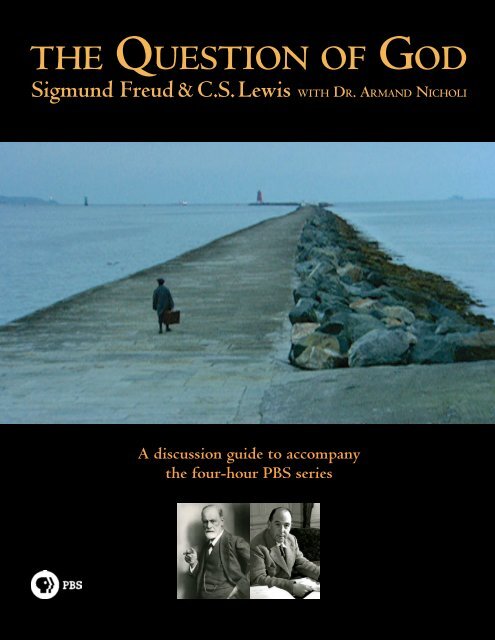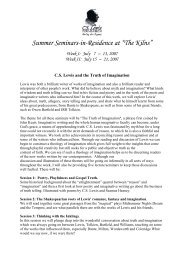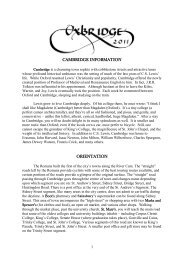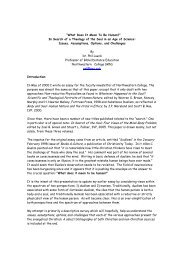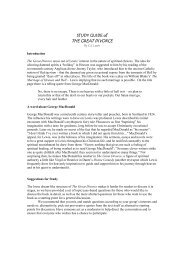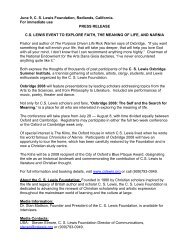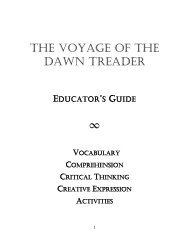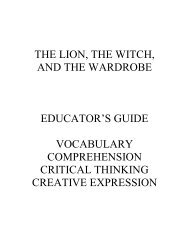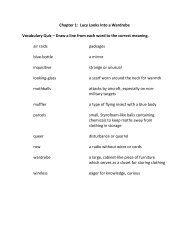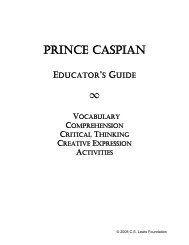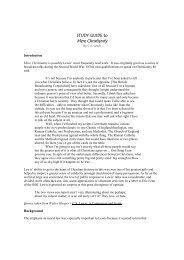The Question of God discussion guide - PBS
The Question of God discussion guide - PBS
The Question of God discussion guide - PBS
You also want an ePaper? Increase the reach of your titles
YUMPU automatically turns print PDFs into web optimized ePapers that Google loves.
A <strong>discussion</strong> <strong>guide</strong> to accompany<br />
the four-hour <strong>PBS</strong> series
Dear Viewer,<br />
When Harvard invited me to teach a course on Sigmund Freud<br />
many years ago, I focused the readings on Freud’s philosophical<br />
writings. <strong>The</strong> students found these works provocative but<br />
unbalanced. When I added C.S. Lewis as a counterpoint, the<br />
class <strong>discussion</strong> ignited.<br />
<strong>The</strong> writings <strong>of</strong> Freud and Lewis are strikingly parallel. Freud<br />
raises an argument and Lewis attempts to answer it. While Freud<br />
continues to serve as the primary spokesman for the secular<br />
worldview in our culture, Lewis, for many, serves as the primary<br />
spokesman for the spiritual worldview.<br />
My book extended the <strong>discussion</strong> <strong>of</strong> “<strong>The</strong> <strong>Question</strong> <strong>of</strong> <strong>God</strong>”<br />
outside the classroom, and I am most pleased to continue the<br />
conversation with this television series. <strong>The</strong> series can serve as an<br />
excellent tool for lively <strong>discussion</strong>s on the most basic issues <strong>of</strong><br />
life with friends and neighbors—as well as in the classroom.<br />
I have found groups <strong>of</strong> 12 to 16 work best.<br />
I encourage you, as I do my students, to focus on the<br />
arguments for both worldviews. Although this may at times be<br />
unsettling, ultimately it will prove strengthening. Above all, it<br />
will enhance your understanding <strong>of</strong> others.<br />
C. S. Lewis<br />
Sigmund Freud<br />
Dr. Armand Nicholi, Jr.<br />
Author, <strong>The</strong> <strong>Question</strong> <strong>of</strong> <strong>God</strong>: C.S. Lewis and Sigmund Freud<br />
Debate <strong>God</strong>, Love, Sex, and the Meaning <strong>of</strong> Life<br />
Dear Viewer,<br />
Does <strong>God</strong> really exist? While it’s not exactly cocktail party<br />
conversation, this is a question on which we each take a position,<br />
both in our biggest decisions and in the minute details <strong>of</strong> our<br />
daily lives. For some <strong>of</strong> us the answer remains the same<br />
throughout our lives; for others, it evolves. When we came across<br />
Dr. Nicholi’s work, we were struck that Freud and Lewis,<br />
arguably two <strong>of</strong> the most revered scholars in recent memory,<br />
chose to devote so much <strong>of</strong> their lives and work to reasoning<br />
through the question <strong>of</strong> <strong>God</strong> and the myriad other questions that<br />
arise from it. As fi lmmakers, we are storytellers, and so many<br />
stories start with such questions.<br />
Though these two men likely never met, their works seem to<br />
speak to each other. <strong>The</strong>ir confl icting worldviews challenge each<br />
other while their shared commitment to reason drives the<br />
dialogue. We have been captivated by this conversation and believe<br />
that you, as a viewer, will fi nd yourself caught up as well. We<br />
welcome you to the table and look forward to the continuation<br />
<strong>of</strong> this debate.<br />
Thank you,<br />
Catherine Tatge and Dominique Lasseur<br />
Director /Producer, Producer
Contents<br />
1 Using this Guide<br />
1 <strong>The</strong> <strong>Question</strong> <strong>of</strong> <strong>God</strong> Web Site<br />
2 Program Descriptions<br />
3 About Sigmund Freud and C.S. Lewis<br />
3 Suggestions for Viewing<br />
3 Guidelines for Facilitating a Discussion<br />
Discussion Guides:<br />
Program 1<br />
4 Discussion 1 Transcendent Experience<br />
5 Discussion 2 Science or Revelation?<br />
6 Discussion 3 <strong>The</strong> Exalted Father<br />
7 Discussion 4 Why Believe?<br />
8 Discussion 5 Miracles<br />
Program 2<br />
9 Discussion 6 Love Thy Neighbor<br />
10 Discussion 7 <strong>The</strong> Human Condition<br />
11 Discussion 8 Moral Law<br />
12 Discussion 9 Suffering and Death<br />
Bibliography<br />
Credits<br />
Using<br />
this Guide<br />
<strong>The</strong> purpose <strong>of</strong> this <strong>guide</strong> is to help facilitate group <strong>discussion</strong>s after viewing <strong>The</strong> <strong>Question</strong> <strong>of</strong> <strong>God</strong>. <strong>The</strong><br />
<strong>guide</strong> is divided into nine sections, which include <strong>discussion</strong> questions, corresponding to the nine panel<br />
<strong>discussion</strong>s in the series. Where appropriate, “answers” are provided following specific questions. <strong>The</strong>se<br />
answers expand on material presented in the film and help to ground <strong>discussion</strong> group participants in<br />
the ideas and beliefs <strong>of</strong> Freud and Lewis. In addition, each set <strong>of</strong> <strong>discussion</strong> questions is introduced by<br />
the key question drawn from the corresponding video segment. <strong>The</strong> introduction also describes the<br />
content <strong>of</strong> each panel <strong>discussion</strong> in the series. Each <strong>discussion</strong> <strong>guide</strong> section includes the following types<br />
<strong>of</strong> questions:<br />
Before Viewing: <strong>The</strong>se questions ground the<br />
<strong>discussion</strong> by helping group participants identify<br />
their own ideas and uncertainties about the topics<br />
the series addresses. This reflection helps identify<br />
what each participant brings to the <strong>discussion</strong> and<br />
hones the group’s focus.<br />
After Viewing: <strong>The</strong> <strong>Question</strong> <strong>of</strong> <strong>God</strong> presents a large<br />
amount <strong>of</strong> information on the lives and ideas <strong>of</strong><br />
Sigmund Freud and C.S. Lewis. <strong>The</strong>se questions<br />
are designed to help participants comprehend the<br />
content and context <strong>of</strong> the series more clearly.<br />
General Discussion: Freud and Lewis’s worldviews<br />
form the basis <strong>of</strong> this series. <strong>The</strong>se <strong>discussion</strong><br />
questions bring their arguments into the present,<br />
engaging participants to critically evaluate them<br />
given their own knowledge and experience.<br />
Also provided, as helpful resources, are brief<br />
facts about the lives <strong>of</strong> Freud and Lewis, group<br />
facilitation tips, and a bibliography <strong>of</strong> books<br />
written by Freud and Lewis.<br />
This <strong>discussion</strong> <strong>guide</strong> is also available<br />
online at: pbs.org/question<strong>of</strong>god<br />
<strong>The</strong> <strong>Question</strong> <strong>of</strong> <strong>God</strong> Web Site<br />
pbs.org/question<strong>of</strong>god<br />
<strong>The</strong> <strong>Question</strong> <strong>of</strong> <strong>God</strong> Web site provides additional<br />
resources to support your group <strong>discussion</strong>.<br />
Below are some highlights from the site.<br />
Two Different Lives: Series video, organized as<br />
side-by-side chapters, which compares the life<br />
stories, or “spiritual biographies,” <strong>of</strong> Lewis and<br />
Freud. Also includes printable program transcripts.<br />
In <strong>The</strong>ir Own Words: A selection <strong>of</strong> expanded<br />
excerpts from the works <strong>of</strong> Lewis and Freud.<br />
Other Voices: A selection <strong>of</strong> readings on seriesrelated<br />
topics by a wider circle <strong>of</strong> thinkers from<br />
various walks <strong>of</strong> life, including Francis Collins,<br />
head <strong>of</strong> the Human Genome Project; stage director<br />
Peter Sellars; philosopher William James; and<br />
comedian/writer Steve Martin.<br />
Nine Conversations: Exchange views online with<br />
other thoughtful individuals around the country.<br />
A <strong>discussion</strong> forum based on each <strong>of</strong> the programs’<br />
nine roundtable conversations lets site visitors<br />
contribute their own ideas on the themes they find<br />
most interesting from the series.<br />
Interviews: Hear from the producers and director,<br />
Dominique Lasseur and Catherine Tatge, and<br />
the author and series’ host, Dr. Armand Nicholi.<br />
Resources: Links to related online resources,<br />
plus books and other relevant materials.<br />
1
Program Descriptions<br />
<strong>The</strong> <strong>Question</strong> <strong>of</strong> <strong>God</strong> explores two diametrically opposed views <strong>of</strong> human existence through the lives<br />
<strong>of</strong> Sigmund Freud and C.S. Lewis. Both wrote passionately on the subject <strong>of</strong> <strong>God</strong>’s existence,<br />
rigorously and relentlessly pursuing truth, and both displayed courage <strong>of</strong> conviction in the ways<br />
they lived their lives. <strong>The</strong>ir intellectual work strives to answer not only what we should believe,<br />
but also how we should live. 1<br />
<strong>The</strong> series raises several fundamental questions: Does <strong>God</strong> exist? How does one decide what is<br />
moral? What does it mean to love your neighbor? How are we to understand suffering and death?<br />
Through dramatic storytelling and compelling re-creations, Freud and Lewis debate the answers<br />
to these questions, and a panel <strong>of</strong> seven men and women, from diverse walks <strong>of</strong> life, confront<br />
these issues in their own lives.<br />
2<br />
<strong>The</strong> <strong>Question</strong> <strong>of</strong> <strong>God</strong>: Sigmund Freud & C.S. Lewis<br />
is available on videocassette and DVD. <strong>The</strong><br />
companion book is also available. To order,<br />
call <strong>PBS</strong> Home Video at 1-800-PLAY-<strong>PBS</strong><br />
VHS $34.99 • DVD $34.99 • Book $25.00<br />
(plus S & H)<br />
Program 1<br />
• This program begins with the early life experiences<br />
<strong>of</strong> Freud and Lewis. Freud is captivated by the power<br />
<strong>of</strong> science. Lewis’s childhood is fi lled with creative<br />
imagination. He recalls his fi rst intense experience<br />
<strong>of</strong> “Joy,” which leads into the fi rst panel <strong>discussion</strong>,<br />
Transcendent Experience.<br />
• At the University <strong>of</strong> Vienna, Freud is fl eetingly<br />
infl uenced by the theistic arguments <strong>of</strong> philosopher<br />
Franz Brentano; however, he chooses scientifi c<br />
materialism, rejecting the spiritual worldview. In<br />
Science or Revelation?, the panelists discuss whether<br />
“scientifi c work is the only road which can lead us<br />
to a knowledge <strong>of</strong> reality.” 2<br />
• Early life experiences lead Lewis to reject his nominal<br />
childhood belief in <strong>God</strong>. Freud’s atheism, however,<br />
results more from an intellectual process. His<br />
exploration <strong>of</strong> the mind through his patients reveals<br />
unexpected, powerful unconscious desires. <strong>The</strong> father<br />
<strong>of</strong> psychoanalysis concludes that the wish for an<br />
all-powerful, benevolent father-fi gure forms the basis<br />
<strong>of</strong> religion. <strong>The</strong> panelists discuss the relationship<br />
between parental authority and the concept <strong>of</strong> an<br />
ultimate authority in <strong>The</strong> Exalted Father.<br />
• <strong>The</strong> last segment <strong>of</strong> Program 1 recounts Lewis’s<br />
dramatic transition from militant atheist to<br />
outspoken believer. <strong>The</strong> panelists examine this<br />
transition in Why Believe? and Miracles.<br />
How each <strong>of</strong> us understands the meaning <strong>of</strong> life comes down<br />
to how we answer one ultimate question:<br />
Does <strong>God</strong> really exist?<br />
THE QUESTION OF GOD<br />
Sigmund Freud & C.S. Lewis WITH DR. ARMAND NICHOLI<br />
SEPTEMBER 15 & 22, 2004<br />
P R O G R A M 2<br />
• <strong>The</strong> program opens with a <strong>discussion</strong> <strong>of</strong> happiness.<br />
While Freud considers its prototype to be sexual love,<br />
Lewis asserts that true happiness can only be found<br />
in a relationship with <strong>God</strong>. Both agree that a great<br />
deal <strong>of</strong> happiness comes from our relationships with<br />
family and friends, but they differ in their<br />
understanding <strong>of</strong> love. In Love Thy Neighbor, the<br />
panelists discuss one <strong>of</strong> the basic precepts <strong>of</strong> the<br />
spiritual worldview that Freud rejects: “Love your<br />
neighbor as yourself.”<br />
• <strong>The</strong> Great War and pervasive anti-Semitism turn<br />
Freud’s attention to the “dark side” <strong>of</strong> humanity. In<br />
addition to the libido, Freud concludes that we are<br />
also driven by a death instinct, a destroying drive.<br />
This leads to a <strong>discussion</strong> <strong>of</strong> <strong>The</strong> Human Condition.<br />
• During the Second World War, the British<br />
Broadcasting Corporation asked Lewis to speak<br />
about the spiritual worldview. His talks, an<br />
overwhelming success, are compiled in the best-selling<br />
book Mere Christianity. This book begins by asserting<br />
that we all seem to fi nd ourselves under the Moral<br />
Law—an absolute standard <strong>of</strong> right and wrong that<br />
transcends time and culture. Lewis argues that the<br />
Moral Law implies a Moral Lawgiver and that our<br />
conscience points undeniably to a Creator. <strong>The</strong><br />
panelists discuss this in Moral Law.<br />
• <strong>The</strong> last segment <strong>of</strong> Program 2 recounts the suffering<br />
that Freud and Lewis endured in their lives—Freud’s<br />
16-year struggle with oral cancer, the death <strong>of</strong> his<br />
daughter, and anti-Semitism, and Lewis’s tragic loss<br />
<strong>of</strong> his wife to cancer. <strong>The</strong> segment ends with how<br />
Freud and Lewis faced their own deaths and a panel<br />
<strong>discussion</strong> on Suffering and Death: Is the existence <strong>of</strong><br />
evil, pain, and suffering consistent with an all-good,<br />
all-powerful <strong>God</strong>?<br />
1 Nicholi, <strong>The</strong> <strong>Question</strong> <strong>of</strong> <strong>God</strong>: C.S. Lewis and Sigmund Freud Debate <strong>God</strong>,<br />
Love, Sex, and the Meaning <strong>of</strong> Life.<br />
2 Freud, <strong>The</strong> Future <strong>of</strong> an Illusion, p. 40.
About Sigmund Freud and C. S. Lewis<br />
S I G M U N D FREUD<br />
C L I V E STAPLES LEWIS<br />
B O R N May 6, 1856, Frieberg, Moravia November 29, 1898, Belfast, Ireland<br />
P R O F E S S I O N Founder <strong>of</strong> Psychoanalysis and physician Pr<strong>of</strong>essor <strong>of</strong> Medieval and Renaissance English,<br />
author, and Christian apologist<br />
M A J O R<br />
I N F L U E N C E S<br />
Johann Wolfgang von Goethe and Charles Darwin<br />
Mentored by Ernst Brücke<br />
Plato, Virgil, Dante, J.R.R. Tolkien<br />
Mentored by William T. Kirkpatrick<br />
F A M I L Y Married Martha Bernays 1886, Six children Married Joy Gresham 1956, Two step-children<br />
T R A D E G Y<br />
& LOSS<br />
Loss <strong>of</strong> a beloved child<br />
Struggled with cancer<br />
Loss <strong>of</strong> his mother during childhood<br />
Death <strong>of</strong> his wife from cancer<br />
W O R L D V I E W Secular or Scientific Spiritual<br />
F A M O U S<br />
P U B L I C A T I O N S<br />
<strong>The</strong> Interpretation <strong>of</strong> Dreams, <strong>The</strong> Future <strong>of</strong> an Illusion,<br />
Civilization and Its Discontents, An Outline<br />
<strong>of</strong> Psychoanalysis, <strong>The</strong> <strong>Question</strong> <strong>of</strong> Lay Analysis,<br />
An Autobiographical Study<br />
<strong>The</strong> Screwtape Letters, Mere Christianity, <strong>The</strong> Problem <strong>of</strong> Pain,<br />
<strong>The</strong> Great Divorce, Miracles, <strong>The</strong> Chronicles <strong>of</strong> Narnia<br />
D I E D September 23, 1939, London, England November 22, 1963, Cambridge, England<br />
Suggestions for Viewing<br />
<strong>The</strong> series can serve as an excellent tool for lively <strong>discussion</strong>s on the most basic issues <strong>of</strong> life with friends and<br />
neighbors—as well as in the classroom. Nine panel <strong>discussion</strong>s covering specific topics are interwoven throughout the<br />
four-hour series. <strong>The</strong>se are natural stopping points for your group <strong>discussion</strong>. <strong>The</strong>re are a number <strong>of</strong> ways you can<br />
view the programs, depending on the time constraints and interests <strong>of</strong> your group. You can view and discuss only the<br />
segments that are relevant to your group’s interests, or view and discuss the entire series. <strong>The</strong> length <strong>of</strong> each video<br />
segment is noted in each <strong>discussion</strong> <strong>guide</strong>. If you choose the latter, here are two suggested viewing strategies:<br />
1 Host nine meetings to view and discuss one program segment at a time.<br />
2 Host four meetings to view and discuss multiple program segments per meeting. Suggested segments include:<br />
Meeting 1: Transcendent Experience; Science or Revelation?<br />
Meeting 2: Exalted Father; Why Believe?; Miracles<br />
Meeting 3: Love Thy Neighbor; <strong>The</strong> Human Condition<br />
Meeting 4: Moral Law; Suffering and Death<br />
In the nine-meeting model, view the program through the conclusion <strong>of</strong> each panel <strong>discussion</strong>, and then use this <strong>guide</strong><br />
to discuss the content. In the abbreviated four-session model, view the suggested segments, then focus on the questions<br />
denoted with this symbol (=) in this <strong>guide</strong>. Whichever option you choose, schedule one to two hours for each meeting.<br />
Guidelines for Facilitating a Discussion<br />
This series raises some challenging questions. People generally identify with either a secular or spiritual worldview and<br />
many have strong opinions on the issues the series raises. Below are some suggestions to help you facilitate an open and<br />
engaging <strong>discussion</strong>.<br />
• If possible, preview the series in its entirety and read the book on which the series is based—<strong>The</strong> <strong>Question</strong> <strong>of</strong> <strong>God</strong>:<br />
C.S. Lewis and Sigmund Freud Debate <strong>God</strong>, Love, Sex, and the Meaning <strong>of</strong> Life, by Dr. Armand M. Nicholi, Jr. This will help to<br />
ground you in the content and give you time to process your own ideas and uncertainties before leading a <strong>discussion</strong>.<br />
You may also want to take a look at the Web site at: pbs.org/question<strong>of</strong>god<br />
• Be aware <strong>of</strong> and sensitive to the worldviews <strong>of</strong> participants—let their interests inform your choice <strong>of</strong> questions.<br />
• Keep the group size manageable—12–16 people or fewer works best.<br />
• Plan your <strong>discussion</strong> sessions and topics based on your group’s needs.<br />
• Review the questions beforehand. If you need additional information, consult the Bibliography.<br />
• Keep in mind that these are sensitive issues. Charged reactions can best be avoided by focusing on the merits<br />
<strong>of</strong> Freud and Lewis’s arguments.<br />
• Remind the group that a major goal <strong>of</strong> the <strong>discussion</strong> is to better understand the worldview they do not embrace,<br />
leading to a better understanding <strong>of</strong> one another.<br />
3
Prog ram One<br />
Discussion One<br />
Lewis called his transformative experience<br />
<strong>of</strong> nature and beauty “Joy”<br />
“If the truth <strong>of</strong> religious doctrines is dependent<br />
on an inner experience…what is one to do<br />
about the many people who do not have this<br />
rare experience?” 3 ~ Freud<br />
“If I find in myself a desire which no experience<br />
in the world can satisfy, the most probable<br />
explanation is that I was made for another<br />
world.” 4 ~ Lewis<br />
Transcendent Experience (32MINUTES)<br />
How much do our early childhood experiences shape our worldview? Sigmund Freud began<br />
his life in a traditional Jewish household surrounded by the archetypal figures he would one day<br />
write about, while “Jack” Lewis grew up in Belfast, with his brother as a constant companion.<br />
Freud and Lewis encountered loss early in life, but their reactions sent them on divergent paths.<br />
<strong>The</strong> panel discusses Freud and Lewis’s early experiences, as well as their own.<br />
<strong>Question</strong>s<br />
3<br />
Freud, Future <strong>of</strong> an Illusion, p. 35.<br />
4<br />
Lewis, Mere Christianity, Book III,<br />
Ch. 10.<br />
5<br />
Lewis, Surprised by Joy, pp. 17–18.<br />
6<br />
Nicholi, <strong>The</strong> <strong>Question</strong> <strong>of</strong> <strong>God</strong>, p. 7.<br />
7<br />
Ibid., p. 7.<br />
Before Viewing<br />
1 How would you describe your “worldview”—your<br />
philosophy <strong>of</strong> life and reason for living?<br />
2 This series considers two diametrically opposed<br />
worldviews. What are your initial impressions <strong>of</strong> the<br />
secular, or “scientific,” worldview? <strong>The</strong> “spiritual”<br />
worldview?=<br />
After Viewing<br />
1 How does Lewis describe “Joy”?= “It is...an<br />
unsatisfied desire which is itself more desirable than any other<br />
satisfaction...and must be sharply distinguished both from<br />
Happiness and from Pleasure....” 5<br />
General Discussion<br />
1 When have you ever experienced Lewis’s Joy?=<br />
2 Do you think every person on Earth has a worldview?<br />
Explain your answer.<br />
3 How has your background (family, culture, education,<br />
life events) influenced your worldview?<br />
4 How much has reason (as opposed to family and<br />
feelings) played a role in the formation <strong>of</strong> your<br />
worldview?<br />
5 How does our worldview influence our lives?= “It<br />
helps us understand where we come from, our heritage; who we<br />
are, our identity; why we exist on this planet, our purpose; what<br />
drives us, our motivation; and where we are going, our destiny.” 6<br />
6 Why discuss Sigmund Freud and C.S. Lewis?=<br />
7 Are the worldviews <strong>of</strong> Freud and Lewis mutually<br />
exclusive?= “Most <strong>of</strong> us make one <strong>of</strong> two basic assumptions:<br />
we view the universe as a result <strong>of</strong> random events and life on this<br />
planet as a matter <strong>of</strong> chance; or we assume an Intelligence beyond<br />
the universe who gives the universe order, and life meaning.” 7<br />
4<br />
Early in life, Freud’s father<br />
immersed him in the Bible
Prog ram One<br />
Discussion Two<br />
“But why anything comes to be there at all,<br />
and whether there is anything behind the things<br />
science observes...this is not a scientific<br />
question.” 8 ~ Lewis<br />
“But scientific work is the only road which can<br />
lead us to a knowledge <strong>of</strong> reality....” 9 ~ Freud<br />
Freud, the young neurologist<br />
Science or Revelation? (12 MINUTES)<br />
Is the scientific method incompatible with the concept <strong>of</strong> revelation? For Freud, the young<br />
neurologist, spiritual reflection seems useless in light <strong>of</strong> biological understanding <strong>of</strong> the human<br />
condition. <strong>The</strong> panel discusses the concept <strong>of</strong> “truth.”<br />
<strong>Question</strong>s<br />
8<br />
Lewis, Mere Christianity, Book I, Ch. 4.<br />
9<br />
Freud, <strong>The</strong> Future <strong>of</strong> an Illusion, p. 40.<br />
Before Viewing<br />
1 What is the “scientific method”?<br />
2 How much <strong>of</strong> what you know derives from scientific<br />
observations you yourself have made?<br />
After Viewing<br />
1 How did medical progress in the late 19th century<br />
change people’s thinking about the human mind?<br />
2 What is our only source <strong>of</strong> reliable knowledge in<br />
Freud’s view?= He writes: “[<strong>The</strong> scientific worldview]<br />
asserts that there are no sources <strong>of</strong> knowledge <strong>of</strong> the universe other<br />
than the intellectual working over <strong>of</strong> carefully scrutinized<br />
observations in other words, what we call research and alongside <strong>of</strong><br />
it no knowledge derived from revelation, intuition or divination.” 10<br />
3 Freud realized that he could not definitively prove or<br />
refute the existence <strong>of</strong> <strong>God</strong>. Why then did he reject<br />
the spiritual worldview? Freud regarded the spiritual<br />
worldview as a form <strong>of</strong> wish-fulfillment. He writes:<br />
“We shall tell ourselves that it would be very nice if there were a<br />
<strong>God</strong> who created the world and was a benevolent Providence, and<br />
if there were a moral order in the universe and an after-life; but it<br />
is a very striking fact that all this is exactly as we are bound to<br />
General Discussion<br />
1 Our current understanding <strong>of</strong> the mind owes much to<br />
Freud. He viewed our “mental apparatus” much like a<br />
complex machine. Freud predicted that the “future may<br />
teach us to exercise a direct influence, by means <strong>of</strong> particular<br />
chemical substances, on…the mental apparatus.” 12 Do you<br />
think that the human mind is fundamentally a physical<br />
device run by chemical reactions?=<br />
2 Is the “scientific method” the best way we have for<br />
establishing truth? Can science explain or answer our<br />
desire for meaning and purpose?=<br />
10<br />
Freud, “<strong>The</strong> <strong>Question</strong> <strong>of</strong> a<br />
wish it to be.”<br />
Weltanschauung,” in <strong>The</strong> Standard Edition<br />
11<br />
For Freud, the scientist, observation was the foundation <strong>of</strong> everything<br />
<strong>of</strong> the Complete Psychological Works, vol.<br />
XXII, p. 159.<br />
11<br />
Freud, <strong>The</strong> Future <strong>of</strong> an Illusion, p. 42.<br />
12<br />
Freud, An Outline <strong>of</strong> Psychoanalysis, p. 62. 5
Prog ram One<br />
Discussion<br />
Three<br />
“<strong>God</strong> was the exalted father, and the longing<br />
for the father was the root <strong>of</strong> the need for<br />
religion.” 13 ~ Freud<br />
“Creatures are not born with desires unless<br />
satisfaction for those desires exists.” 14 ~ Lewis<br />
<strong>The</strong> death <strong>of</strong> his father triggers vivid dreams<br />
which Freud connects with the unconscious<br />
<strong>The</strong> Exalted Father (26 MINUTES)<br />
Do our early relationships color our attitudes in later life toward the concept <strong>of</strong> an ultimate<br />
authority? Bereft by his mother’s death years earlier, Lewis witnesses brutality and harsh<br />
conditions in WWI that leave him furious at <strong>God</strong>. <strong>The</strong> tragedy <strong>of</strong> his disintegrating practice and<br />
dying father leads Freud on a journey <strong>of</strong> self-analysis, culminating in his conclusion that fear,<br />
longing, and admiration for our fathers are manifested in every religion as attitudes toward <strong>God</strong>.<br />
<strong>The</strong> panel discusses the role <strong>of</strong> human relationships in one’s choice <strong>of</strong> worldview.<br />
<strong>Question</strong>s<br />
13 Freud, <strong>The</strong> Future <strong>of</strong> an Illusion, p. 28.<br />
14 Lewis, Mere Christianity, Book III, Ch. 10.<br />
15 Freud, “<strong>The</strong> <strong>Question</strong> <strong>of</strong> a<br />
Weltanschauung,” in <strong>The</strong> Standard<br />
Edition <strong>of</strong> the Complete Psychological Works,<br />
vol. XXII, p. 163.<br />
16 Nicholi, <strong>The</strong> <strong>Question</strong> <strong>of</strong> <strong>God</strong>, p. 25.<br />
Before Viewing<br />
1 What influence did your parents have on your<br />
worldview?<br />
2 What characteristics would you wish <strong>God</strong> to have if<br />
He existed? Are these similar to the characteristics<br />
<strong>of</strong> an ideal parent? How or how not?=<br />
After Viewing<br />
1 What factors (family, culture, education, and life<br />
events) influenced the formation <strong>of</strong> Freud and<br />
Lewis’s worldviews?<br />
2 What is Freud’s “Oedipus Complex”?<br />
General Discussion<br />
1 In Freud’s view, belief in <strong>God</strong> arises out <strong>of</strong> a<br />
deep-seated, powerful wish for an omnipotent Father:<br />
“When a human being has himself grown up...he is in<br />
possession <strong>of</strong> greater strength, but his insight into the perils <strong>of</strong> life<br />
has also grown greater...he still remains just as helpless and<br />
unprotected as he was in his childhood....Even now, therefore,<br />
he cannot do without the protection which he enjoyed as a child.” 15<br />
Does wishing for <strong>God</strong> mean that He does or does<br />
not exist?=<br />
2 In his analysis <strong>of</strong> himself and his patients, Freud<br />
discovered ambivalent feelings directed toward the<br />
father. “Freud asserts that one’s ambivalence toward parental<br />
authority—especially the positive feelings <strong>of</strong> that ambivalence—<br />
forms the basis <strong>of</strong> one’s deep-seated wish for <strong>God</strong>.” 16 Might<br />
strong negative feelings toward one’s father (or<br />
parental authority in general) lead to the wish that<br />
<strong>God</strong> not exist?=<br />
3 Have we created <strong>God</strong> in the image <strong>of</strong> an Exalted<br />
Father? Or has <strong>God</strong> created us, together with our<br />
concept <strong>of</strong> the “ideal” parent that resembles Him?=<br />
Freud with patient undergoing psychoanalysis<br />
6
Prog ram One<br />
“I was at this time living…in a whirl <strong>of</strong><br />
Discussion Four<br />
contradictions. I maintained that <strong>God</strong> did not<br />
exist. I was also very angry with <strong>God</strong> for not<br />
existing.” 17 ~ Lewis<br />
“...[I]n the long run nothing can withstand reason<br />
and experience, and the contradiction which<br />
religion <strong>of</strong>fers to both is all too palpable.” 18<br />
~ Freud<br />
A reluctant convert, Lewis returns to<br />
belief in <strong>God</strong><br />
Why Believe? (18 MINUTES)<br />
Does the persistent human longing for <strong>God</strong> prove that He exists? Embarking upon his career at<br />
Oxford, Lewis flirts with the idea that <strong>God</strong> may be just a tempting illusion before concluding that<br />
his desire for <strong>God</strong> is in fact evidence <strong>of</strong> his existence. <strong>The</strong> panel discusses the reasoning behind<br />
their worldviews.<br />
<strong>Question</strong>s<br />
17 Lewis, Surprised by Joy, p. 115.<br />
18 Freud, Future <strong>of</strong> an Illusion, p. 69.<br />
19 Lewis, Surprised by Joy, p. 238.<br />
20 Lyall, “Owen Barfield, 99, Word<br />
Lover and C. S. Lewis Associate,” in<br />
the New York Times, 19 December 1997.<br />
21 Freud, <strong>The</strong> Future <strong>of</strong> an Illusion, p. 38.<br />
Before Viewing<br />
1 What influences could prompt a transition in<br />
worldview in adulthood?<br />
2 How open are you to the worldview you do not<br />
embrace? Describe your thought processes as you<br />
weighed the evidence both for and against embracing<br />
a particular worldview?<br />
After Viewing<br />
1 Lewis begins to explore the meaning <strong>of</strong> his experiences<br />
<strong>of</strong> “Joy.” (Review his description on page 4). What<br />
did he conclude?= Lewis writes: “But I now know that<br />
the experience…was valuable only as a pointer to something other<br />
and outer.” 19<br />
2 What did the writer-philosopher Owen Barfield<br />
(whom Lewis called “the wisest and best <strong>of</strong> my<br />
un<strong>of</strong>ficial teachers” 20 ) believe about the imagination?<br />
3 What were some <strong>of</strong> the influences that changed<br />
Lewis’s worldview?<br />
4 Lewis’s worldview shifted from spiritual to scientific<br />
and back during adulthood, while Freud never wavered<br />
in his embrace <strong>of</strong> the scientific worldview. What role<br />
did their chosen fields play in their choices? Why did<br />
Lewis waver? Why didn’t Freud?<br />
General Discussion<br />
1 Freud argues that religious ideas are “fulfillments <strong>of</strong> the<br />
oldest, strongest and most urgent wishes <strong>of</strong> mankind. <strong>The</strong> secret<br />
<strong>of</strong> their strength lies in the strength <strong>of</strong> these wishes.” 21 Do you<br />
believe that Lewis wished for <strong>God</strong>?=<br />
2 Was Lewis’s transition primarily intellectual or<br />
emotional? Was Lewis free to turn away from the<br />
spiritual worldview? Explain your reasoning.=<br />
Lewis’s class at Oxford, where he studied philosophy and the Classics<br />
(Lewis in bottom row, fourth from right)<br />
7
Prog ram One<br />
Discussion Five<br />
“Tales <strong>of</strong> miracles...contradicted everything...taught by<br />
sober observation and betrayed too clearly the influence<br />
<strong>of</strong> the activity <strong>of</strong> the human imagination.” 22 ~ Freud<br />
“If anything extraordinary seems to have happened, we<br />
can always say that we have been the victims <strong>of</strong> an<br />
illusion. If we hold a philosophy which excludes the<br />
supernatural, that is what we always shall say. What<br />
we learn from experience depends on the kind <strong>of</strong><br />
philosophy we bring to experience.” 23 ~ Lewis<br />
Freud believed religious power laid in<br />
reawakened memories <strong>of</strong> very emotional<br />
episodes in human history<br />
Miracles (24 MINUTES)<br />
How would Jesus Christ be received if he lived now? His work being slow to take <strong>of</strong>f, Freud<br />
sees mythology reflected in history and psychology, cementing his belief that there is truth in<br />
science whereas all else is illusion. Following heated debates with fellow Oxford scholars Hugo<br />
Dyson and J.R.R. Tolkien and a brief attraction to Hinduism, Lewis concludes that embracing<br />
Christ and worshipping <strong>God</strong> will allow him to reach “Joy.” <strong>The</strong> panel discusses Jesus Christ—<br />
lunatic, liar, or Lord?<br />
<strong>Question</strong>s<br />
22 Freud, “<strong>The</strong> <strong>Question</strong> <strong>of</strong> a<br />
Weltanschauung,” in the Standard<br />
Edition <strong>of</strong> the Complete Psychological Works,<br />
vol. XXII, p.168.<br />
23 Lewis, Miracles, p. 2.<br />
24 Merriam-Webster’s Collegiate Dictionary<br />
(10th ed.), p. 742.<br />
25 Lewis, Miracles, p. 5.<br />
26 Freud, Civilization and Its Discontents,<br />
Before Viewing<br />
1 What is a miracle? Webster’s defines it as “an<br />
extraordinary event manifesting divine intervention in human<br />
affairs.” 24 Lewis uses the word miracle “to mean an<br />
interference with Nature by supernatural power.” 25<br />
2 Are miracles possible in the “scientific” or secular<br />
worldview? Explain your answer.<br />
After Viewing<br />
1 What is the role <strong>of</strong> mythology in Freud’s thinking?<br />
2 Why does Freud regard the spiritual worldview as<br />
childish? “<strong>The</strong> whole thing is so patently infantile, so foreign<br />
to reality, that to anyone with a friendly attitude to humanity it<br />
is painful to think that the great majority <strong>of</strong> mortals will never<br />
be able to rise above this view <strong>of</strong> life.” 26<br />
3 Why did it matter to Lewis whether the New<br />
Testament was historically accurate?<br />
General Discussion<br />
1 As an atheist, Lewis regarded the Bible stories as<br />
myth. What was your first reaction to biblical<br />
teachings? How has it held up or not held up?=<br />
2 What claims did Jesus <strong>of</strong> Nazareth make? Who<br />
do you think he was?=<br />
3 In the New Testament, Jesus claimed to be the Son<br />
<strong>of</strong> <strong>God</strong>. Was he a lunatic or simply a great moral<br />
teacher?= <strong>The</strong> writer G.K. Chesterton points out,<br />
“no great moral teacher ever claimed to be <strong>God</strong>—not Mohammed,<br />
not Micah, not Malachi, or Confucius, or Plato, or Moses, or<br />
Buddha.” 27 Lewis concludes: “A man who was merely a<br />
man and said the things Jesus said would not be a great moral<br />
teacher. He would either be a lunatic...or else he would be the<br />
Devil <strong>of</strong> Hell. You must make your choice....You can shut<br />
Him up for a fool, you can spit at Him and kill Him as a<br />
demon; or you can fall at His feet and call Him Lord and <strong>God</strong>.<br />
But let us not come with any patronizing nonsense about His<br />
being a great human teacher. He has not left that open to us.<br />
He did not intend to.” 28<br />
p. 22.<br />
27 Nicholi, <strong>The</strong> <strong>Question</strong> <strong>of</strong> <strong>God</strong>, p. 88.<br />
28 Lewis, Mere Christianity, Book II, Ch. 3.<br />
8<br />
Lewis embraces Christ and concludes he has reached the object <strong>of</strong> his desire—“Joy”
Prog ram Two<br />
Discussion Six<br />
“[Agape is] a state <strong>of</strong> the will, which we have naturally<br />
about ourselves, and must learn to have about other<br />
people.” 29 ~ Lewis<br />
“[Sexual love] has thus furnished us with a pattern for<br />
our search for happiness.” 30 ~ Freud<br />
Lewis’s book <strong>The</strong> Four Loves explores Storge<br />
(affection), Philia (friendship), Eros (sexual love),<br />
and Agape (selfless love)<br />
Love Thy Neighbor (34 MINUTES)<br />
Can we really love our neighbor as ourselves? Decried as a pornographer for asserting that<br />
humans are motivated by sexual desires from birth, Freud is unbowed in his belief that religious<br />
pursuit is man’s greatest illusion. Standing against the tide <strong>of</strong> secularism sweeping academia,<br />
Lewis pens <strong>The</strong> Four Loves, where he explores the nature <strong>of</strong> the four Greek words that are translated<br />
“love,” including “agape” (selfless love). <strong>The</strong> panel discusses the idea <strong>of</strong> selfless love.<br />
<strong>Question</strong>s<br />
Freud’s book Sexualtheorie is a series <strong>of</strong><br />
essays on humans’ sexual feelings and desires<br />
from birth on<br />
Before Viewing<br />
1 What is happiness?=<br />
After Viewing<br />
1 What is Freud’s view <strong>of</strong> happiness? Why did he think<br />
it is elusive?<br />
2 In what ways did Lewis’s transition from the<br />
materialist to the spiritual worldview change him?<br />
3 In Lewis’s view, what are the four kinds <strong>of</strong> love we<br />
experience? What is agape, and how is it different from<br />
the other forms <strong>of</strong> love?=<br />
General Discussion<br />
1 Does our worldview affect our ability to experience<br />
happiness?<br />
2 How do Freud and Lewis’s views <strong>of</strong> love differ?=<br />
3 Why did Freud find the precept to “love your<br />
neighbor as yourself ” so unreasonable?= He writes:<br />
“If I love someone, he must deserve it in some way....Not merely<br />
is…[a] stranger in general unworthy <strong>of</strong> my love; I must honestly<br />
confess that he has more claim to my hostility....He seems not<br />
to have the least trace <strong>of</strong> love for me....Indeed if this grandiose<br />
commandment had run ‘Love thy neighbor as thy neighbor loves<br />
thee,’ I should not take exception to it.” 31 Freud concludes that<br />
this ideal precept is impossible to fulfill: “nothing else<br />
runs so strongly counter to the original nature <strong>of</strong> man.” 32<br />
4 “<strong>The</strong> key to understanding the precept ‘to love your<br />
neighbor as yourself,’ Lewis says, is to understand the<br />
phrase ‘as yourself.’ How do we love ourselves?” 33 =<br />
29 Lewis, Mere Christianity, Book III, Ch. 9.<br />
30 Freud, Civilization and Its Discontents, p. 33.<br />
31 Ibid., pp. 66–67.<br />
32 Ibid., p. 70.<br />
33<br />
Nicholi, <strong>The</strong> <strong>Question</strong> <strong>of</strong> <strong>God</strong>, p. 176.<br />
9
Prog ram Two<br />
Discussion<br />
Seven<br />
“Often enough the violent, cunning or ruthless man<br />
seizes the envied good things <strong>of</strong> the world and the<br />
pious man goes away empty.” 34 ~ Freud<br />
“[F]ree will, though it makes evil possible, is also the<br />
only thing that makes possible any love or goodness<br />
or joy worth having.” 35 ~ Lewis<br />
Freud with his daughter Sophie, who died<br />
<strong>of</strong> influenza<br />
<strong>The</strong> Human Condition (17 MINUTES)<br />
How can one explain the evil in the world? Amidst the tragedy <strong>of</strong> World War I and the deaths<br />
<strong>of</strong> his daughter and grandson, Freud implores people to cast away their self-deceptions and realize<br />
that religion cannot truly console. <strong>The</strong> panel discusses the manifestations and reasons for “evil.”<br />
<strong>Question</strong>s<br />
Before Viewing<br />
1 Do we all have a “dark side”? Explain your answer.<br />
2 How much <strong>of</strong> your behavior is determined with<br />
the opinions <strong>of</strong> others in mind? Would your actions<br />
be different if no one were ever to know about them?<br />
After Viewing<br />
1 What drew Freud’s attention to the dark side <strong>of</strong><br />
human beings?<br />
2 In Freud’s view, where does human evil originate?<br />
3 What is the origin <strong>of</strong> human evil in Lewis’s<br />
worldview?<br />
General Discussion<br />
1 Lewis writes: “When souls become wicked they will certainly<br />
use this possibility to hurt one another; and this perhaps accounts<br />
for four-fifths <strong>of</strong> the sufferings <strong>of</strong> men. It is men, not <strong>God</strong>,<br />
who have produced racks, whips, prisons, slavery, guns, bayonets,<br />
and bombs....” 36 Explain why you agree or disagree.=<br />
2 In Lewis’s worldview, how could an all-good, allpowerful<br />
<strong>God</strong> permit human evil and the suffering<br />
it causes?=<br />
3 A basic precept <strong>of</strong> Lewis’s worldview is to forgive<br />
and love our enemies. Is this possible? Is it sensible?<br />
Is embracing the spiritual worldview necessary to<br />
do this? How does this relate to Lewis’s concept<br />
<strong>of</strong> loving one’s neighbor?=<br />
34 Freud, “<strong>The</strong> <strong>Question</strong> <strong>of</strong> a<br />
Weltanschauung,” in <strong>The</strong> Standard<br />
Edition <strong>of</strong> the Complete Psychological Works,<br />
vol. XXII, p. 167.<br />
35 Lewis, Mere Christianity, Book II, Ch. 3.<br />
36 Lewis, <strong>The</strong> Problem <strong>of</strong> Pain, p. 89.<br />
10<br />
<strong>The</strong> death <strong>of</strong> Sophie’s son, Heinele, reinforced Freud’s<br />
non-belief in <strong>God</strong>
Prog ram Two<br />
Discussion<br />
Eight<br />
“It is after you have realized that there is a real Moral<br />
Law, and a Power behind the law, and that you have<br />
broken that law and put yourself wrong with that<br />
Power—it is after all this, and not a moment sooner,<br />
that Christianity begins to talk.” 37 ~ Lewis<br />
“It would be an undoubted advantage if we were to<br />
leave <strong>God</strong> out altogether and honestly admit the purely<br />
human origin <strong>of</strong> the regulations and precepts<br />
<strong>of</strong> civilization.” 38 ~ Freud<br />
Moral Law (22 MINUTES)<br />
Where do we get our concept <strong>of</strong> right and wrong? Lewis solidifies his position as a defender <strong>of</strong><br />
the Christian faith with British radio broadcasts and the publication <strong>of</strong> Mere Christianity, <strong>The</strong> Screwtape<br />
Letters, and <strong>The</strong> Problem <strong>of</strong> Pain, maintaining throughout that the human conscience and morality itself<br />
exist because <strong>of</strong> <strong>God</strong>. <strong>The</strong> panel explores their “moral codes.”<br />
<strong>Question</strong>s<br />
37 Lewis, Mere Christianity, Book I, Ch. 5.<br />
38 Freud, <strong>The</strong> Future <strong>of</strong> an Illusion, p. 53.<br />
39 Lewis, Mere Christianity, Book I, Ch. 1.<br />
40 Ibid., Ch. 2.<br />
41 Ibid.<br />
42 Nicholi, <strong>The</strong> <strong>Question</strong> <strong>of</strong> <strong>God</strong>, p. 63.<br />
43 Freud, “<strong>The</strong> <strong>Question</strong> <strong>of</strong> a<br />
Weltanschauung,” in <strong>The</strong> Standard<br />
Edition <strong>of</strong> the Complete Psychological Works,<br />
vol. XXII, p. 171.<br />
Before Viewing<br />
1 Are we born with an innate sense <strong>of</strong> right and wrong?<br />
Explain your reasoning.=<br />
2 To what extent has your moral code been influenced<br />
by your parents, culture, worldview, etc.?<br />
After Viewing<br />
1 Where does our morality come from, according to<br />
Freud?=<br />
2 In Lewis’s worldview, is the Moral Law just a social<br />
convention, or does it reflect real truths, which we<br />
discover like the laws <strong>of</strong> mathematics?=<br />
Lewis wrote prolifically in the late ‘30s and ‘40s<br />
General Discussion<br />
1 Lewis writes: “[T]hough there are differences between the moral<br />
ideas <strong>of</strong> one time or country and those <strong>of</strong> another, the differences<br />
are not really very great....[T]hink <strong>of</strong> a country where people<br />
were admired for running away in battle, or where a man felt<br />
proud <strong>of</strong> double-crossing all the people who had been kindest to him.<br />
You might just as well try to imagine a country where two and<br />
two made five.” 39 Does the idea <strong>of</strong> a universal Moral<br />
Law support Lewis’s or Freud’s view <strong>of</strong> its origins?=<br />
2 If a conflict arises as a result <strong>of</strong> a difference in moral<br />
beliefs, how should it be resolved? Is Lewis right in<br />
saying that “the moment you say that one set <strong>of</strong> moral ideas<br />
can be better than another, you are, in fact, measuring them both<br />
by a standard....You are, in fact, comparing them both with<br />
some Real Morality, admitting that there is such a thing as a real<br />
Right...”? 40 Are there absolute, universal moral<br />
truths?=<br />
3 Lewis writes: “If no set <strong>of</strong> moral ideas were truer or better than<br />
any other, there would be no sense in preferring civilized morality<br />
to savage morality, or Christian morality to Nazi morality.” 41<br />
Should we be tolerant <strong>of</strong> different moral codes?<br />
Explain your reasoning.=<br />
4 Freud believed that the solution to human evil lay in<br />
education and “the dictatorship <strong>of</strong> reason.” 42 “Our best hope for<br />
the future is that intellect—the scientific spirit, reason—may in<br />
process <strong>of</strong> time establish a dictatorship in the mental life <strong>of</strong> man.” 43<br />
Do you agree that the more education people obtain,<br />
the more moral they become?=<br />
11
Prog ram Two<br />
Discussion<br />
Nine<br />
“Obscure, unfeeling and unloving powers<br />
determine men’s fate.” 44 ~ Freud<br />
“<strong>God</strong> whispers to us in our pleasures, speaks<br />
in our conscience, but shouts in our pains:<br />
it is His megaphone to rouse a deaf world.” 45<br />
~ Lewis<br />
<strong>The</strong> devastating loss <strong>of</strong> his wife, Joy,<br />
rekindles Lewis’s struggles with his faith<br />
Suffering and Death (41 MINUTES)<br />
How do you equate an omnipotent, all-loving being with what we’ve come to expect and<br />
experience in our lives? Cancer-stricken, Freud escapes to England, where he speaks out against<br />
the Third Reich, continues his work on the unconscious mind, and dies as he lived, an atheist,<br />
with no last-minute appeal to <strong>God</strong>. Following the death <strong>of</strong> his wife, Joy, Lewis faces the greatest<br />
spiritual crisis <strong>of</strong> his life, concluding that <strong>God</strong> is not always understood, but He is always there.<br />
<strong>The</strong> panelists examine suffering and death.<br />
<strong>Question</strong>s<br />
Before Viewing<br />
1 Given the suffering and evil throughout history, is it<br />
likely that humans would create an all-powerful,<br />
loving <strong>God</strong>? Why or why not?<br />
2 Freud writes: “Our unconscious then does not believe in its<br />
own death; it behaves as if it were immortal.” 46 Can you<br />
conceive <strong>of</strong> your own death—<strong>of</strong> non-existence?<br />
After Viewing<br />
1 What is “<strong>The</strong> Problem <strong>of</strong> Pain”?=<br />
2 How did Freud face his own death? How did he<br />
choose to die?<br />
3 What was Lewis’s reaction to his wife’s death? How<br />
did he resolve this?<br />
General Discussion<br />
1 How can the good and bad <strong>of</strong> human existence<br />
be reconciled if there is an all-loving <strong>God</strong>? If there<br />
is not?=<br />
2 How does your worldview influence how you<br />
confront death?=<br />
44 Freud, “<strong>The</strong> <strong>Question</strong> <strong>of</strong> a<br />
Weltanschauung,” in <strong>The</strong> Standard Edition<br />
<strong>of</strong> the Complete Psychological Works, vol.<br />
XXII, p. 167.<br />
45 Lewis, <strong>The</strong> Problem <strong>of</strong> Pain, p. 93.<br />
46 Freud, “Thoughts for the Times on<br />
War and Death,” in <strong>The</strong> Standard Edition<br />
<strong>of</strong> the Complete Psychological Works, vol. XIV,<br />
p. 296.<br />
Ravaged by cancer, Freud spends his last years in great pain<br />
12
Bibliography<br />
Freud, Sigmund. An Autobiographical Study. New York: W.W.<br />
Norton, 1952.<br />
———. Civilization and Its Discontents. New York: W.W.<br />
Norton, 1961.<br />
———. <strong>The</strong> Future <strong>of</strong> an Illusion. New York: W.W.<br />
Norton, 1961.<br />
———. An Outline <strong>of</strong> Psychoanalysis. New York: W.W.<br />
Norton, 1949.<br />
———. Psychoanalysis and Faith: <strong>The</strong> Letters <strong>of</strong> Sigmund Freud<br />
and Oskar Pfi ster. Edited by Heinrich Meng and Ernst L.<br />
Freud. New York: Basic Books, 1963.<br />
———. <strong>The</strong> <strong>Question</strong> <strong>of</strong> Lay Analysis. New York: W.W.<br />
Norton, 1978.<br />
———. <strong>The</strong> Standard Edition <strong>of</strong> the Complete Psychological<br />
Works <strong>of</strong> Sigmund Freud. Translated under the general<br />
editorship <strong>of</strong> James Strachey in collaboration with Anna<br />
Freud, assisted by Alix Strachey and Alan Tyson. 24 vols.<br />
London: <strong>The</strong> Hogarth Press, 1962.<br />
Gay, Peter. Freud: A Life for Our Times. New York:<br />
Doubleday, 1988.<br />
———. “Sigmund Freud: A Brief Life” in Freud,<br />
<strong>The</strong> Future <strong>of</strong> an Illusion. New York: W.W. Norton, 1989.<br />
Lewis, C.S. <strong>The</strong> Four Loves. New York: Harcourt, Brace,<br />
1960.<br />
———. A Grief Observed. New York: Bantam Books,<br />
1961.<br />
———. Mere Christianity. New York: Harper Collins,<br />
2001.<br />
———. Miracles: A Preliminary Study. New York: Harper<br />
Collins, 2001.<br />
———. <strong>The</strong> Problem <strong>of</strong> Pain. New York: Harper Collins,<br />
2001.<br />
———. <strong>The</strong> Screwtape Letters, with Screwtape Proposes a Toast.<br />
New York: Harper Collins, 2001.<br />
———. Surprised by Joy: <strong>The</strong> Shape <strong>of</strong> My Early Life. New<br />
York: Harcourt Brace, 1955.<br />
Nicholi, Armand M., ed. <strong>The</strong> Harvard Guide to Psychiatry<br />
(3rd Edition). Cambridge: Belknap Press <strong>of</strong> the Harvard<br />
University Press, 1999.<br />
Nicholi, Armand M. <strong>The</strong> <strong>Question</strong> <strong>of</strong> <strong>God</strong>: C.S. Lewis and<br />
Sigmund Freud Debate <strong>God</strong>, Love, Sex, and the Meaning <strong>of</strong> Life.<br />
New York: <strong>The</strong> Free Press, 2002.<br />
Yerushalmi, Yosef H. Freud’s Moses: Judaism Terminable and<br />
Interminable. New Haven: Yale University Press, 1991.<br />
How each <strong>of</strong> us understands the meaning <strong>of</strong> life comes down<br />
to how we answer one ultimate question:<br />
Does <strong>God</strong> really exist?<br />
THE QUESTION OF GOD<br />
Sigmund Freud & C.S. Lewis WITH DR. ARMAND NICHOLI<br />
SEPTEMBER 15 & 22, 2004<br />
<strong>The</strong> <strong>Question</strong> <strong>of</strong> <strong>God</strong>: Sigmund Freud & C.S. Lewis<br />
is available on videocassette and DVD. <strong>The</strong><br />
companion book is also available. To order,<br />
call <strong>PBS</strong> Home Video at 1-800-PLAY-<strong>PBS</strong><br />
VHS $34.99 • DVD $34.99 • Book $25.00<br />
(plus S & H)
Credits<br />
<strong>The</strong> <strong>Question</strong> <strong>of</strong> <strong>God</strong> <strong>discussion</strong> <strong>guide</strong> was<br />
produced by Walden Media and the<br />
WGBH Educational Foundation. <strong>The</strong><br />
content was written and developed for<br />
Walden Media by Frederick S. Lee, M.D.,<br />
Ph.D., Brigham and Women’s Hospital<br />
and Harvard Medical School and<br />
Ryan Taliaferro, A.B., doctoral candidate,<br />
Harvard Business School.<br />
WALDEN MEDIA<br />
Director, Educational Content<br />
Jean Kwon, Ed.M.<br />
Project Lead & Copyeditor<br />
Erin Mackey<br />
THE QUESTION OF GOD<br />
Executive Producers<br />
Mike Sullivan<br />
Catherine Tatge<br />
Doug Holladay<br />
Producer<br />
Dominique Lasseur<br />
Director<br />
Catherine Tatge<br />
WGBH<br />
Director <strong>of</strong> Educational Outreach<br />
Karen Barss<br />
Director <strong>of</strong> Education Initiatives<br />
Julie Benyo<br />
Print Project Director<br />
Sonja Latimore<br />
Design<br />
Gaye Korbet<br />
Cara Joslin<br />
Print Production<br />
Lenore Gibson<br />
<strong>The</strong> <strong>Question</strong> <strong>of</strong> <strong>God</strong> is produced by<br />
Tatge/Lasseur Productions in association<br />
with WGBH and Walden Media.<br />
TATGE/LASSEUR PRODUCTIONS<br />
Major funding is provided by<br />
Laurance Rockefeller, the John Templeton<br />
Foundation, <strong>The</strong> Arthur Vining Davis<br />
Foundations, the Paul Montrone<br />
Foundation, Tom and Gert Phillips, the<br />
ServiceMaster Company, the Corporation<br />
for Public Broadcasting, and public<br />
television viewers.<br />
Additional funding is provided by the<br />
Aslan Foundation, the Butt Foundation,<br />
CNL, the FairWyn Foundation, the<br />
Fidelity Foundation, Harty and<br />
Carolyn Gardner, Hughes Supply, Inc.,<br />
Vester Hughes, the Elizabeth M. Irby<br />
Foundation, Paul and Teresa Klaassen,<br />
the ME Foundation, Billy and Gladys<br />
Mitchell, Joan Wellhouse Newton,<br />
Gerard and Marie Roche, and the<br />
Stratford Foundation.<br />
A complete list <strong>of</strong> funders is available<br />
from <strong>PBS</strong>.<br />
© 2004 Walden Media, LLC. Walden<br />
Media is a registered trademark <strong>of</strong> Walden<br />
Media, LLC. <strong>The</strong> Walden Media skipping<br />
stone logo is a trademark <strong>of</strong> Walden<br />
Media, LLC. Permission is granted for<br />
reproduction <strong>of</strong> this printed material.<br />
All other rights reserved. Other than as<br />
discussed above, no part <strong>of</strong> <strong>The</strong> <strong>Question</strong> <strong>of</strong><br />
<strong>God</strong> <strong>discussion</strong> <strong>guide</strong> may be reproduced,<br />
used in a retrieval system, or transmitted<br />
in any form or by any means, electronic,<br />
mechanical, photocopying, recording, or<br />
otherwise, without prior written<br />
permission <strong>of</strong> Walden Media, LLC,<br />
294 Washington Street, 7th Floor, Boston,<br />
MA 02108. Please send permission<br />
requests to the attention <strong>of</strong> Erin Mackey.<br />
Photo credits: (Except as noted here all<br />
images are screen grabs from the series.<br />
Copyright Tatge/Lasseur Productions.)<br />
Cover: bottom, left: Sigmund Freud,<br />
<strong>The</strong> Granger Collection, NY; right:<br />
C.S. Lewis, Arthur Strong/Camera Press/<br />
Retna, Ltd. Inside front cover, top: C. S.<br />
Lewis used by permission by the Marion<br />
E. Wade Center, Wheaton College,<br />
Wheaton, IL.; bottom: Sigmund Freud<br />
copyrights. Page 4, bottom: <strong>The</strong> Freud<br />
Museum, London. Page 5: Sigmund Freud<br />
copyrights. Page 7, bottom: <strong>The</strong> Master<br />
and Fellows <strong>of</strong> University College,<br />
Oxford. Page 10, top: Sigmund Freud<br />
Copyrights/Mary Evans Picture Library.<br />
Page 12, bottom: Sigmund Freud<br />
copyrights.<br />
<strong>The</strong> <strong>Question</strong> <strong>of</strong> <strong>God</strong> is closed captioned by<br />
the Media Access Group at WGBH for<br />
viewers who are deaf or hard <strong>of</strong> hearing.<br />
R E V I E W E R S<br />
Dr. Michael Schermer<br />
Founding Publisher, Skeptic Magazine<br />
Director, <strong>The</strong> Skeptics Society<br />
Jeremy Fraiberg, J.D.<br />
Attorney<br />
Torys LLP<br />
J. Douglas Holladay<br />
Partner<br />
Park Avenue Equity Partners<br />
0407039


